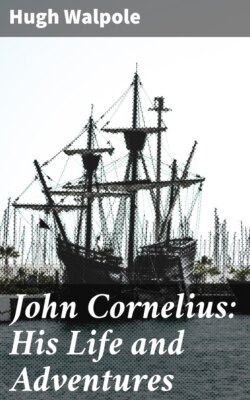Читать книгу John Cornelius: His Life and Adventures - Hugh Walpole - Страница 3
На сайте Литреса книга снята с продажи.
FOREWORD It has been only after much thought and consideration that I have finally decided on the form that this book must take. John Cornelius died on December 8th, 1921. During the years since his death there has appeared an official biography;[1] also, among others, two critical works of especial importance.[2]
ОглавлениеTable of Contents
Mr. Speed’s biography contains everything about Cornelius necessary for the world to know and it is written in an admirably wise and judicious spirit.
It may be said, moreover, that the constant appreciation and attention now given to Cornelius’ work, the universal fame that some of his books, especially The Bright-Green Shoes and The Flight of the Wild Swans, have now obtained for him, make any further account at present a work of supererogation. For a considerable time I was myself of this opinion. It is true that in the later years of Cornelius’ life I was his closest and most intimate friend, but I most willingly gave Mr. Speed the use of any knowledge that I might have, many hundreds of letters from Cornelius to myself, and other documents.
The fact remains, however, that I have been driven to write this book. Stefan Zweig says, in his preface to his Life of Mary Stuart: ‘Mystery is a spur to creative imagination.’ And here it is my creative imagination that has been most especially at work. Creative imagination working on facts should lead to something behind the facts—that I have tried here to solve some of Cornelius’ mystery is my only justification.
This book has been written in the form of a novel. I shall be perfectly content if many of my readers consider it only as a novel. And yet I would strongly maintain that it is more than a novel based on the life of John Cornelius. Cornelius enjoyed greatly to speak of himself and his life. He was the greatest egoist I have ever known and the least exasperating. For hours one could listen to him as he described his youth, his first strange days in London, his meetings with Carstang, Charlie Christian, Anne Swinnerton and many more, his marriage, his War experiences and the rest. He would give you conversations, word by word, dramatically impersonating the actors, would describe scenes in all their natural details. Many of these I copied afterwards into my notebooks.
I may myself have been sometimes in this book unjust in my verdicts, biased in my summaries.
What I have tried to do is to re-create the scene and Cornelius in the middle of it. Many things were told me by Carstang, by Anne, by Charlie Christian. They had, each one of them, his or her separate idea and notion of Cornelius. No one of them was wholly right. I cannot hope that I have been wholly right either. But I feel, as I re-read these pages, that for myself at least Cornelius, as I knew him, is here. He would himself, I am sure, have preferred this form.
He said to me once: ‘I would like to write my life like a novel. They say that no novel in the first person can ever be true because no one can recall conversations as they actually occurred nor remember the physical details of past scenes. But that is not so. I can recall the white shine of the paint on the little chair in my mother’s cottage and how she would say “Ah, Lordy, Lordy, what a life it is!” ... But I can’t write it. It would turn into one of my less credible fairy-stories. But you shall; one day you shall. As a novel, with the sea coming in, the lifting salt waves meeting the trickling fresh-water stream, then the hats with the roses and poppies of Lady Max—and myself, watching in the wings of the theatre, shivering with cold and fright, and Carstang with his bottle of green ink, and the friends I sat with in the château at Baupon ... write it all down. Even if they never believe it, it will be true all the same.’ His memory was prodigious, but not more so than that of Malleson or Rose or Roughwood, to all of whom I have listened about their childhood. Perhaps many of us, if encouraged by an attentive audience, could describe our earlier years in the same detail.
So that I have tried to do, in the way that he would like it, even to the old-fashioned chapter-headings.
Meanwhile it is of Cornelius only that I have been thinking—Cornelius whom I loved, who so often irritated me to frenzy, who was compounded of so many opposites, who, nevertheless, was of an absolute simplicity.
The one word finally to be used about him was, I think, fidelity. He was faithful; faithful to his friends, to his work—above everything else, faithful to himself.
H. W.
[1] John Cornelius: Life and Letters, by Martin Speed (Longworth and Hutton). 1923.
[2] John Cornelius: An Appreciation, by Simon Larg (Borden and Long). 1926.—John Cornelius, by P. Strutt (Seligman). 1931.
